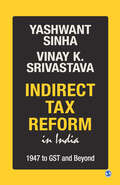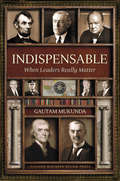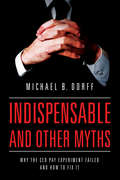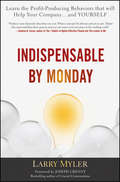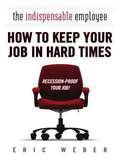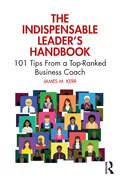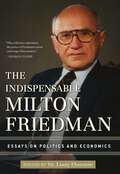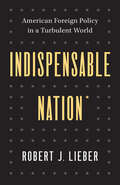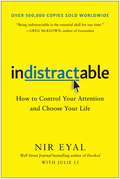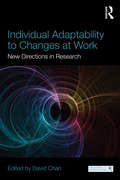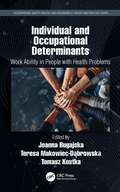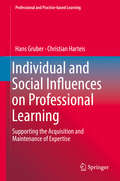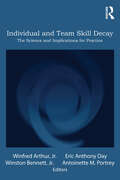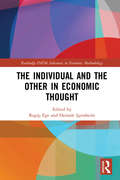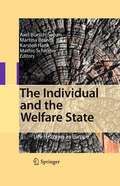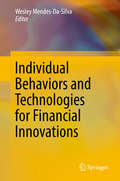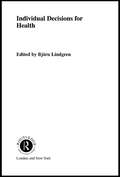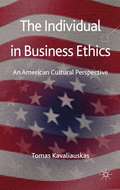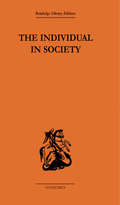- Table View
- List View
Indirect Benefits of Innovation: Making Innovation Pay
by Harold L. Sirkin James P. Andrew John ButmanPayback from innovation means cash, but innovation also delivers other noncash benefits that can be valuable when they have the potential to lead to cash with some certainty. This chapter examines these benefits.
Indirect Tax Reform in India: 1947 To GST and Beyond
by Yashwant Sinha Vinay K. SrivastavaIndirect taxes have played an increasingly important role in the Indian economy. Indirect tax was first introduced in India in 1944 in the form of excise duty on Indian products as a measure of protection for goods imported from the UK. In the course of time, it became a well-established tax to shore up government finances. The need for reform in indirect taxes was felt soon after Independence, and several committees were appointed for this purpose. From there, the process of reforms of indirect taxes in India went through ups and downs till the introduction of the Goods and Services Tax (GST) in 2017. Indirect Tax Reform in India: 1947 to GST and Beyond maps these developments in detail and analyses the political economy behind it. It also deals with the current problems, the conceptual infirmities and the reforms needed urgently to restrict the disruption it has caused in the economy so far. This book outlines the impact of the past measures and the present changes, and suggests the future course of action for a better future.
Indispensable
by Gautam MukundaWill your next leader be insignificant-or indispensable?The importance of leadership and the impact of individual leaders has long been the subject of debate. Are they made by history, or do they make it?In Indispensable, Harvard Business School professor Gautam Mukunda offers an enticingly fresh look at how and when individual leaders really can make a difference. By identifying and analyzing the hidden patterns of their careers, and by exploring the systems that place these leaders in positions of power, Indispensable sheds new light on how we may be able to identify the best leaders and what lessons we can learn, from both the process and the result.Profiling a mix of historic and modern figures-from Thomas Jefferson and Abraham Lincoln to Winston Churchill and Judah Folkman-and telling the stories of how they came to power and how they made the most important decisions of their lives, Indispensable reveals how, when, and where a single individual in the right place at the right time can save or destroy the organization they lead, and even change the course of history.Indispensable will also help you understand this new model so you can use it in your own life-whether you're a citizen casting a ballot, an executive choosing your next CEO, or a leader trying to make your mark.
Indispensable and Other Myths
by Michael DorffProdded by economists in the 1970s, corporate directors began adding stock options and bonuses to the already-generous salaries of CEOs with hopes of boosting their companies' fortunes. Guided by largely unproven assumptions, this trend continues today. So what are companies getting in return for all the extra money? Not much, according to the empirical data. In Indispensable and Other Myths: Why the CEO Pay Experiment Failed and How to Fix It, Michael Dorff explores the consequences of this development. He shows how performance pay has not demonstrably improved corporate performance and offers studies showing that performance pay cannot improve performance on the kind of tasks companies ask of their CEOs. Moreover, CEOs of large established companies do not typically have much impact on their companies' results. In this eye-opening exposé, Dorff argues that companies should give up on the decades-long experiment to mold compensation into a corporate governance tool and maps out a rationale for returning to the era of guaranteed salaries.
Indispensable By Monday
by Larry MylerSeparates fact from fiction for what makes an employee indispensableWhen trying to move ahead or even just keep a job, there are actions that would be of great advantage to any employee and there are strategies that are just plain stupid. Interestingly enough, the stupid strategies are used twice as frequently in corporate America. Indispensable By Monday goes beyond conventional wisdom to reveal and impart the skills and behaviors that any employee at any level of any organization can implement to bring substantial dollars to the company.Author Larry Myler and organizational performance consulting firm VitalSmarts asked 1,800 corporate leaders to identify the bottom-line behaviors that would make employees essential to their organizations. Now, Myler distills what he learned for every employee and employer. Indispensable By Monday outlines the profit-producing behaviors that distinguish workers who add value from those who don't, such as reducing company costs, increasing income, improving key processes, bringing back lost customers and more.
The Indispensable Employee: How to keep your job in hard times
by Eric WeberWhen it comes to job security, there are no guarantees. But there are ways to beat the odds. To become a key player. To become irreplaceable. Now, at a time when people are losing their jobs at an alarming rate all across America, bestselling author Eric Weber’s updated edition provides the basic tools to keeping your job.
The Indispensable Leader's Handbook: 101 Tips From a Top-Ranked Business Coach
by James M. KerrThe culmination of 30 years of management consulting and leadership coaching, this collection of tried-and-true tips will make you a better leader when you work to make them yours.Unlike other leadership coaching books, this is not a guide to help coaches improve their skills but to help leaders improve by folding coaching techniques into their leadership approach. It covers a wide variety of topics, from mindset to culture to change management, and each tip comes with a suggested action for executive, mid-level, and supervisory leaders, ensuring this book’s value regardless of your current leadership role within your organization. Each of the 101 tips is also accompanied by its “why,” Guru Guidance that outlines implications, and an Idea Crosswalk section that shows how each tip corresponds to other parts of the book to facilitate innovative thinking about how it can be best put to use.Enabling good leaders to become exceptional ones by incorporating coaching skills into their leadership practices, this clear and practical reference guide will become a go-to resource for current and future business leaders, coaches, and mentors, as well as executive education providers.
The Indispensable Milton Friedman: Essays on Politics and Economics
by Lanny EbensteinMilton Friedman is one of the most famous economists in history. His writings and theories on everything from capitalism and freedom to deregulation and welfare have inspired movements, influenced government policies, and changed the course of America's economic history.Now, acclaimed Friedman biographer Dr. Lanny Ebenstein brings together twenty of Friedman's greatest essays in his new book, The Indispensable Milton Friedman: Essays on Politics and Economics. The only collection of Friedman's writings to span his entire career, The Indispensable Milton Friedman: Essays on Politics and Economics features some of Friedman's never-before-republished writings as well as the best and most timeless of his works.These exceptional essays not only illuminate the progression of Friedman's thought, but explain how America might overcome some of its most difficult challenges. Broken into two sections, politics and economics, The Indispensable Milton Friedman shows how we can ultimately turn America around, and is more necessary than ever during this critical election year and time of economic uncertainty.
Indispensable Nation: American Foreign Policy in a Turbulent World
by Robert J. LieberA clear-eyed analysis of the role the United States should play in the world as it exists today The United States remains &“the indispensable nation.&” In this book, the distinguished international relations theorist and foreign policy specialist Robert Lieber argues that in a world full of revisionist powers, America&’s role is more important than ever. No other country is capable of playing that role. America remains the essential pillar of the postwar liberal order. It is a center of both political and financial stability, and it promotes important values that the revisionist powers do not. Not beholden to any particular theory, this is a clear-eyed analysis of the role the United States should play in the world as it exists today.
Indistractable: How to Control Your Attention and Choose Your Life
by Nir Eyal"Indistractable provides a framework that will deliver the focus you need to get results." —James Clear, author of Atomic Habits "If you value your time, your focus, or your relationships, this book is essential reading. I'm putting these ideas into practice." —Jonathan Haidt, author of The Righteous Mind National Bestseller Winner of the Outstanding Works of Literature (OWL) Award Included in the Top 5 Best Personal Development Books of the Year by Audible Included in the Top 20 Best Business and Leadership Books of the Year by Amazon Featured in The Amazon Book Review Newsletter, January 2020 Goodreads Best Science & Technology of 2019 Finalist You sit down at your desk to work on an important project, but a notification on your phone interrupts your morning. Later, as you're about to get back to work, a colleague taps you on the shoulder to chat. At home, screens get in the way of quality time with your family. Another day goes by, and once again, your most important personal and professional goals are put on hold. What would be possible if you followed through on your best intentions? What could you accomplish if you could stay focused? What if you had the power to become "indistractable?" International bestselling author, former Stanford lecturer, and behavioral design expert, Nir Eyal, wrote Silicon Valley's handbook for making technology habit-forming. Five years after publishing Hooked, Eyal reveals distraction's Achilles' heel in his groundbreaking new book. In Indistractable, Eyal reveals the hidden psychology driving us to distraction. He describes why solving the problem is not as simple as swearing off our devices: Abstinence is impractical and often makes us want more. Eyal lays bare the secret of finally doing what you say you will do with a four-step, research-backed model. Indistractable reveals the key to getting the best out of technology, without letting it get the best of us. Inside, Eyal overturns conventional wisdom and reveals: Why distraction at work is a symptom of a dysfunctional company culture—and how to fix it What really drives human behavior and why "time management is pain management" Why your relationships (and your sex life) depend on you becoming indistractable How to raise indistractable children in an increasingly distracting world Empowering and optimistic, Indistractable provides practical, novel techniques to control your time and attention—helping you live the life you really want.
Inditex: 2000
by Galen Danskin John R. WellsIn 2000, Inditex was one of the largest specialty apparel retailers in the world, with $2.4 billion in sales from 1,080 stores across 33 countries. Zara, Inditex's main brand, produced popular designer items at a fraction of design-house prices and could push an item from design to display in less than two weeks. This left most other fashion retailers, who took between 9-12 months for this process, far behind. However, Inditex was still only one-sixth the size of the world's largest specialty retailer, US-based Gap, and two-thirds the size of its Swedish rival, H&M. Amancio Ortega, Inditex's notoriously private Chairman and founder, was committed to challenging these industry leaders. This expansion required more capital and, in July 2000, the company announced it would IPO in 2001. There was also the question of a new management team to take the company forward. Ortega was approaching retirement as was the CEO, Jos Maria Castellano. The first attempt to find a younger CEO had failed. Hopefully, an IPO would attract a new management team that could maintain Inditex's rapid expansion.
Inditex: 2012
by Galen Danskin John R. WellsIn the 11 years since its public offering, Inditex and its flagship brand, Zara, had expanded into 86 countries, achieved $21.6 billion in revenue, and become the largest specialty apparel retailer in the world. In marked contrast to the general malaise of the Bolsa de Madrid, Inditex's share price tripled from 2008 to 2012 and traded at 25 times expected 2013 earnings, a 15% premium over Swedish rival, H&M. From 1,080 stores in 2000, it had expanded to 6,009 locations while sales and operating profits grew 25% p.a over this period. It had also established online stores across 23 different markets, with plans for launches in Russia and Canada during 2013, and it managed eight different brands. CEO Pablo Isla remained confident of future success and anticipated store expansion would continue growing at 8%-10% per year for the next three to five years. How could Inditex best maintain its strong growth and fend off competition?
Individual Adaptability to Changes at Work: New Directions in Research (Organization and Management Series)
by David ChanIndividual adaptability to changes at work refers to an individual’s response to new demands or ill-defined problems created by uncertainty, complexity, mergers, and any rapid change in the work situation. Today, one of the key factors for an individual’s success is said to be adaptability. In the past two decades there has been increasing interest in the research on individual adaptability, and this is one of the first academic volumes to look at this important topic. Specific contexts examined include work-family conflict, retirement, career management and intercultural interaction at the workplace. The book will provide a comprehensive and integrated analysis of the conceptual, assessment and contextual issues that will help identify the current trends and emerging themes in adaptability research.
Individual and Occupational Determinants: Work Ability in People with Health Problems (Occupational Safety, Health, and Ergonomics)
by Joanna BugajskaThere are individual and professional factors that have the greatest impact on the preservation of work ability for people of advanced age, and people with chronic health issues and disabilities. This text examines the demographic trends in the population and shows that proper functioning in their lives is only possible if people are provided with appropriate psychosocial and physical working conditions. This publication discusses physiological changes that occur with age and influence work performance. It presents the concept of applying the International Classification of Functioning, Disability and Health (ICF) in order to assess the work ability of people with disabilities. It shows, using examples and case studies, that practical activities aimed at appropriate working conditions for people of advanced age, and people with health issues and disabilities, will have excellent work ability. Features Presents a comprehensive approach to workplace tolerance for people with health issues Offers an innovated in-depth evaluation of the Work Ability Index (WAI) Presents applying the International Classification of Functioning, Disability and Health (ICF) to access the work ability of people with disabilities Outlines actions that should be taken to maintain work ability for people of advanced age or with disabilities Provides real case studies and analysis. "Demographic changes, especially those related to aging, belong to the main changes occurring in the contemporary working environment. Thus, preserving work ability in the older population as well as [populations with] health concerns are among the most important challenges of today. Accordingly, the monograph fits into the most recent issues of [this] public health area, focusing on work ability in populations at risk of social exclusion, also occupational exclusion. These are older people, persons with chronic diseases and those with different types of disabilities. In my opinion, highlighting the problem of work ability in the context of aging by the authors, in such a broad understanding, is extremely valuable and useful and the presented research outcome is an authentic and very much expected contribution to the discussion on this issue. The topic has been thoroughly presented, which undoubtedly results from the interdisciplinarity of the group of authors including specialists in work physiology, physicians and physiotherapists. The monograph provides a very measurable and reliable knowledge in this field. Combining the theory with the presentation of the authors’ research outcomes is an unquestionable advantage of the monograph…".—Jolanta Walusiak-Skorupa, Nofer Institute of Occupational Medicine, Łódź, Poland
Individual and Social Influences on Professional Learning: Supporting the Acquisition and Maintenance of Expertise (Professional and Practice-based Learning #24)
by Hans Gruber Christian HarteisThis book examines professional learning and relates it to the acquisition of expertise, and the influence of individuals. Professional learning, as discussed in the book, comprises all kinds of occupational domains because employment and paid work usually follow the achievement principle, i.e. workers are expected to perform efficiently. The book suggests that the perspective of expertise research is an appropriate lens to use for gaining insight in how individuals can be prepared and enabled to autonomously master the requirements of daily working life. Expertise is understood as the capacity to reliably perform on an extraordinary level, and the basic assumption is that experts are best prepared to successfully cope with future challenges at workplaces. The book comprehensively discusses issues of expertise research and explores the nature of a successful individual and an impeded individual. It proposes an integrated model of individual and social components of expertise development, the i-PPP model. The model provides insight in and an understanding of how individuals can be enabled to develop and maintain professional expertise in the context of daily work. Across all paradigms, researchers, policy-makers, employers and trade unionists agree that working conditions undergo permanent change through economic, societal, and technological developments. Recently, the digitalisation of (working) life became a hot topic of scientific and societal discourses. Workplaces, thus, provide challenges for individuals who have to be able to cope with workplace changes. Accordingly, new challenges emerge for an adequate understanding of learning for work as well as learning during work.
Individual and Team Skill Decay: The Science and Implications for Practice (Applied Psychology Series)
by Jr. Winston Bennett Winfred Arthur Eric Anthony Day Antoinette M. PortreySkill and knowledge retention is a major issue and concern in learning and skill acquisition, especially when trained or acquired skills (or knowledge) are needed after long periods of nonuse. The goal of this book is to summarize and advance the thinking of critical issues related to skill retention and decay in the context of individual and team training on complex tasks. This volume will be of interest to researchers and practitioners in the fields of industrial and organizational psychology, human factors, organizational behavior, and human resources management.
Individual and the Corporation: Kathy Levinson and ETRADE (A)
by Susan S. Harmeling Joseph L. Badaracco Jr.Kathy Levinson, the president and COO of ETRADE and a lesbian mother of two children, must decide whether and how to participate in the "No on Knight" campaign. The campaign opposes California ballot proposition 22, which requires California to recognize only marriages between a man and a woman. This case provides background for Levinson's decision, in which she must balance her obligations as an executive with her personal values and commitments.
Individual and the Corporation: Kathy Levinson and ETRADE (B)
by Susan S. Harmeling Joseph L. Badaracco Jr.Supplements the (A) case.
The Individual and the Other in Economic Thought: An Introduction (Routledge INEM Advances in Economic Methodology)
by Ragip Ege Herrade IgersheimThe Philosophy of Economics primarily considers the economic agent as a moral subject. Economics, however, has long overlooked the agent’s moral – that is to say, reasonable – dimension, to focus instead on the strictly rational. This volume seeks to address this neglected topic through exploring the Individual and the Other. The economic agent refers to "himself" (herself) in terms of his desire and passions, yet also refers to others besides himself. For the rational economic agent, what is the nature of this relationship with the Other? Should it not be understood as undergoing a transformation once we come to consider the economic agent as a reasonable being? Through what process does the Other pass from being an instrument at the disposal of a rational agent to being an end in itself for a moral subject? In other words, how does another become "an Other"? These questions are behind the re-examination of certain fundamental notions which takes place in this book, an examination which involves a re-reading of certain great authors. With contributions from authors around the world, this work is divided into three main parts. The first deals with individuals from the history of economic thought such as Adam Smith, Karl Marx and Hannah Arendt; this is then followed by a thematic section in which the concepts of recognition and subjectivity are questioned in a market context. Finally, the third part offers an analysis of the issue of "the Individual and the Other" in different fields of the recent economic analysis including game theory, decision theory or social choice. The Individual and the Other in Economic Thought aims to help the reader better understand how the relationship between the Individual and the Other has been conceived, conceptualized and framed in economic analysis. It will be of great use to graduate students, scholars and any reader interested in this crucial issue.
The Individual and the Welfare State
by Mathis Schröder Martina Brandt Karsten Hank Axel Börsch-SupanOur health, our income and our social networks at older ages are the consequence of what has happened to us over the course of our lives. The situation at age 50+ reflects our own decisions as well as many environmental factors, especially interventions by the welfare state. This book explores the richness of 28,000 life histories in thirteen European countries, collected as part of the Survey of Health, Ageing and Retirement in Europe (SHARE). Combining these data with a comprehensive account of European welfare state interventions provides a unique opportunity to answer the important public policy questions of our time - how the welfare state affects people's incomes, housing, families, retirement, volunteering and health. The overarching theme of the welfare state creates a book of genuinely interdisciplinary analyses, a valuable resource for economists, gerontologists, historians, political scientists, public health analysts, and sociologists alike.
Individual Behaviors and Technologies for Financial Innovations
by Wesley Mendes-Da-SilvaThis book offers comprehensive examination of research on the relevance of individual behavior and technology to financial innovations. The chapters cover current topics in finance including integrated reporting, people finance, crowdfunding, and corporate networks. It provides readers with an organized starting point to explore individual behaviors and new technologies used in financial innovations. The explicit and growing speed of the spread of new technologies has hastened the emergence of innovation in the field of finance. Topics like the Internet of Things, semantic computing and big data finance are motivating the construction of financial tools that translate into new financial mechanisms. This book strives help readers better understand the dynamic of the changes in financial systems and the proliferation of financial products.Individual Behaviors and Technologies for Financial Innovations is organized in 16 chapters, organized in three parts. Part I has eight chapters that review the research on gender differences in attitudes about risk and propensity to purchase automobile insurance, financial literacy models for college students, wellness and attitude of university students in the use of credit cards, impact of programs income distribution and propensity to remain in employment, financial literacy and propensity to resort to informal financing channels, risk behavior in the use of credit cards by students. Part II reviews the research on financing for startups and SMEs, exploring funding through crowdfunding platform, operating credit unions, and using networks of friends to finance small businesses outside the domestic market. The four chapters of Part III describe contexts of financial innovation in listed companies, including society's demands on their behavior - we discuss motivations for companies to participate in corporate sustainability indexes, corporate performance through their profile of socially responsible investments, influence of networks of social relations in the formation of boards, and management of companies, and also the precariousness of financial decisions in large companies, as well as the role of the internet in corporate communication with the market.
Individual Decisions for Health
by Björn LindgrenAlthough economics is a relative newcomer to research into the determinants of good health, its significance should not be under-estimated. This book poses the important question of whether economic theory can be developed to explain why people engage in activities that are obviously a danger to their long-term health.In looking first at the indivi
Individual FoodService, Kelso, and Ken Sweder
by Alys Ferragamo Jo TangoWhen and how much risk to take? In October 2020, Ken Sweder, CEO of Individual FoodService ("IFS"), contemplated this question as he evaluated a proposal to acquire Brady Industries, a distributor of janitorial and sanitation products. Sweder and his private equity partners at Kelso & Company had been working hard to grow IFS, and now they had a unique opportunity to make a transformative acquisition. The deal had great potential and risks; it was unclear if this was the right time to make such a large, complex acquisition amid disruptions from the COVID-19 pandemic. Sweder needed to decide if he should recommend the transaction and, if so, how to set the right value creation plan for the combined company.
The Individual in Business Ethics: An American Cultural Perspective
by Tomas KavaliauskasToday we are witnessing social and political dominance of large corporations. They provide for its employees moral values and business principles. Moreover, they institutionalize their codes of ethics. The theory of Business Ethics provides the moral guideline and standards for corporate life and concrete business organizations apply those standards to practice. The individual employee, as a member of a business organization, accepts those standards. Therefore, it is important to examine the foundation of the individual's moral value in Business Ethics in order to understand on what the foundation of the moral value depends on. This highly interdisciplinary text is a critique of Business Ethics as an ideology and life politics. The author discloses how contemporary business ethics grovels before corporations, how it is too weak to create a truly critical voice of American capitalist economy. The individual's treatment in corporate life is revealed through the eyes of American Protestant culture and its coercive work tradition where efficiency value usurps values of individual choice and freedom. This book suggests a new concept of an out-corporate individual.
The Individual in Society: Papers on Adam Smith
by A. L. MacfieAdam Smith's Wealth of Nations has been among the world books for over two hundred years and has gathered a mythology, which does scant justice to the actual book. One reason for this was that the Wealth of Nations was one of a series of studies through which Smith hoped to complete his system of moral, social and natural philosophy. The Individual in Society illustrates this system, especially in relation to Smith's other major work, The Theory of Moral Sentiments and examines its relation to the Wealth of Nations. Included are: * Chapters on the views of important commentators such as Zeyss, Eckstein, Jacob Viner and James Bonar * Discussion of the ethical and sociological background of Smith's work and its influence on the thought of the next century.

